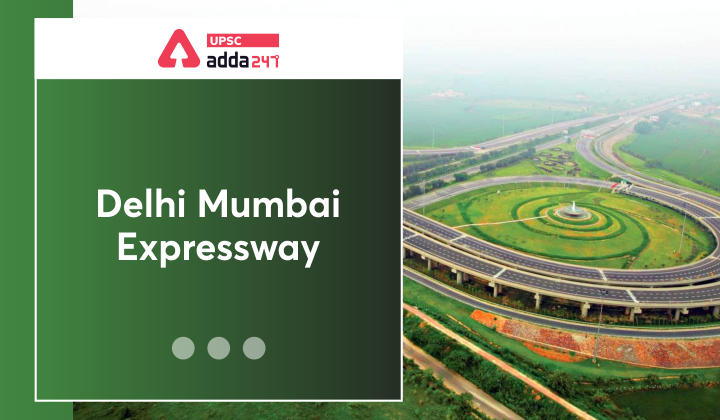Table of Contents
Relevance
- GS 3: Infrastructure: Energy, Ports, Roads, Airports, Railways etc.
Context
- Recently, Union Minister for Road Transport and Highways Nitin Gadkari concluded the two-day review of the work progress on the 1380-km eight-lane Delhi-Mumbai Expressway.
Key points
About the Delhi-Mumbai expressway
- It is being constructed with a total outlay of Rs 98,000 crore, and will cover a total length of 1,380 km.
- The first phase from Delhi-Jaipur (Dausa)-Lalsot and Vadodara-Ankleshwar is expected to be open to traffic by March 2022. The expressway is expected to be completed by March 2023.
- The foundation stone of the project was laid on March 9, 2019.
- Over 15,000 hectares of land has been acquired across states for the construction of the Delhi-Mumbai expressway.
- More than 12 lakh tonnes of steel will be consumed in the construction of the expressway, which is equivalent to building 50 Howrah bridges.
Benefits
- The expressway will reduce travel time between certain cities to 12-12.5 hours from 24 hours.
- The expressway will feature a spur to Jewar Airport and Jawaharlal Nehru Port to Mumbai through a spur in Mumbai.
- The expressway will improve connectivity to economic hubs like Jaipur, Kishangarh, Ajmer, Kota, Chittorgarh, Udaipur, Bhopal, Ujjain, Indore, Ahmedabad, Vadodara and Surat.
- The expressway will have wayside amenities – resorts, restaurants, food courts, fuel stations, facilities for truckers, logistics parks.
- A helicopter ambulance service for accident victims will be provided and a heliport, which will use drone services for business will also be provided.
- Over two million trees and shrubs are planned to be planted along the highway.
- The expressway is the first in Asia and only the second in the world to feature animal overpasses to facilitate unrestricted movement of wildlife.
- The expressway will result in annual fuel savings of more than 320 million litres and reduce CO2 emissions by 850 million kg which is equivalent to the planting of 40 million trees.
- The project has also created employment for thousands of trained civil engineers and more than 50 lakh man days of work.



 TSPSC Group 1 Question Paper 2024, Downl...
TSPSC Group 1 Question Paper 2024, Downl...
 TSPSC Group 1 Answer key 2024 Out, Downl...
TSPSC Group 1 Answer key 2024 Out, Downl...
 Cabinet Ministers of India 2024, New Cab...
Cabinet Ministers of India 2024, New Cab...







